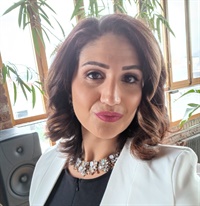Information
The Future of Social Equity in the Face of a National DEI Takedown
As diversity, equity, and inclusion (DEI) programs face mounting legal and political attacks across the country, cannabis social equity initiatives are at a critical inflection point. Designed to repair the harms of the War on Drugs and create meaningful opportunities for those most impacted by prohibition, these programs are now under threat from shifting executive actions and priorities, public sentiment, and litigation aimed at dismantling equity-focused policies. This panel will deliver a candid conversation concerning the evolving legal landscape of cannabis equity programs across the country, how anti-DEI efforts will impact social equity programs in the cannabis industry, and opportunities to reimagine equity frameworks in a way that can withstand political headwinds and actually deliver on their promise.
Fatima Afia, Associate, Rudick Law Group, PLLC

Fatima Afia is a cannabis attorney and civil litigator at Rudick Law Group, PLLC, with a background in commercial and business litigation, land use and landmarks law matters, and disability insurance law. As a litigator, Fatima was an instrumental member of the litigation team behind Washington v. Barr, a pro-bono lawsuit brought against the federal government that sought to declare the federal law criminalizing cannabis unconstitutional. As part of her work in Washington v. Barr, Fatima led the effort in securing overwhelming amicus support before the U.S. Supreme Court from seven members of Congress, 19 disparate and highly regarded organizations, and two eminent cannabis researchers and scientists. In connection with her disability insurance work, she has helped secure and maintain disability benefits for clients from some of the largest disability insurance companies in the United States, playing a vital role in the firm's successful administrative appeal against Unum Insurance Company which resulted in an award of approximately $1 million in retroactive benefits for the client.
As a cannabis attorney, Fatima assists cannabis clients navigate the legal cannabis and hemp industry in the areas of corporate law and regulatory compliance, business transactions, litigation, and state licensing applications in various jurisdictions including New York, Massachusetts, and New Jersey. Fatima is also a social equity advocate, providing instrumental testimony to the Cannabis Control Commission in Massachusetts in 2019 which resulted in an expedited license application-review process for women-and-minority-owned businesses that were unfairly excluded from the regulatory definition of a social equity applicant. Fatima is also an article contributor for Marijuana Venture, has regularly organized and chaired CLE panels and events for the International Cannabis Bar Association (“INCBA”), and is the Co-Chair of INCBA’s CLE Committee. She was the Moot Court Winner at the Medical Cannabis Conference held at Columbia University in 2019, and in 2021 was named a Rising Star by Super Lawyers Magazine.
Fatima attended Brooklyn Law School where she graduated in the top 20% percent of her graduating class.
Jason Ortiz, Director of Strategic Initiatives, Last Prisoner Project

Jason Ortiz is the Director of Strategic Initiatives for the Last Prisoner Project Jason was arrested for simple cannabis possession at the age of 16 in Norwich CT, and that experience inspired him to become a cannabis justice advocate. After graduating from the University of connecticut in Storrs with a degree in Public and Community Engagement, He was one of the founding board Members of the Minority Cannabis Business Association where he empowered legacy entrepreneurs of color to become policy advocates through the organizing of 5 cannabis policy summits that brought together dozens of stakeholders of color to draft model Social Equity legislation.
In his home state of Connecticut, Jason was a founding member of Connecticut United For Reform and Equity and the lead drafter of 2021's HB6377, “An act creating an equitable and modern cannabis workforce”, which was ultimately incorporated into Connecticut's cannabis legalization framework. After ending prohibition in his home state, Jason took his skills to the national level as and is the immediate past Executive Director of Students for Sensible Drug Policy, where he trained hundreds of students how to end the war on drugs through community organizing, policy development and lobbying, and direct action.
In addition to his drug policy activism Jason sits on the board of the CT Working Families Party and has served as President of the Connecticut Puerto Rican Agenda where he organized for economic justice for his home island of Puerto Rico.
Tauhid Chappell, E.D., NJ Dept. Of State's Cannabis Training Academy, New Jersey Business Action Center

Tauhid Chappell is the first Executive Director to lead the New Jersey Department of State's Cannabis Training Academy, the country’s first government-run program aimed at diversifying the cannabis industry by supplying free education, information and directional resources to prospective social equity, legacy, MWDV-owned, microbusiness or Impact Zoned businesses in New Jersey. Tauhid brings 10 years of experience in the cannabis space as a medical marijuana patient, a journalist who’s covered legalization efforts across the country, a former budtender for Philadelphia’s second medical marijuana dispensary and a current Adjunct Professor at Thomas Jefferson University, where he teaches the country’s first graduate-level course that studies the impact and outcomes of equity movements in the cannabis industry.
After organizing two cannabis conferences focused on media and equity in Philadelphia in 2019 and 2020, he combined forces with dozens of stakeholders and organized the Philadelphia CannaBusiness Association, Pennsylvania's first Black-owned, Black-led cannabis nonprofit aimed at healing the damage done by cannabis prohibition and mass incarceration.
Tauhid also serves as an Executive Board Member and a credentialed Parliamentarian of the Philadelphia Association of Black Journalists, the first and oldest association of Black journalists in the country. An 8-year veteran of the media industry, he’s worked as a social media editor at The Washington Post, joined the Philadelphia Inquirer as an audience engagement editor, then moved to the Free Press, a media policy nonprofit focused on equitable access for broadband and internet, the break up of media conglomerates, equity and reparations in media.
Cat Packer, Director of Drug Markets & Legal Regulation, Drug Policy Alliance

Cat Packer is the director of drug markets and legal regulation at the Drug Policy Alliance. In this role, she leads DPA’s efforts to replace prohibition with regulatory systems grounded in science, compassion, health and human rights.
Cat is a distinguished cannabis policy practitioner in residence at The Ohio State University Moritz College of Law’s Drug Enforcement and Policy Center and an Affiliated Researcher with the Project on Psychedelics Law and Regulation (POPLAR) at the Petrie-Flom Center for Health Law Policy, Biotechnology, and Bioethics at Harvard Law School.
Cat serves on the board of directors of the Cannabis Regulators of Color Coalition and is an advisor to the Parabola Center for Law and Policy. Additionally, she has served as a contributing author to the Thomas Reuters Cannabis Law Deskbook where she’s authored chapters on local authority and cannabis social equity policies & programs.
Cat is the first person of color in the United States to lead a medical and adult-use cannabis regulatory program. From 2017 to 2022, she served as the first Executive Director of the City of Los Angeles Department of Cannabis Regulation.
Cat is a proud alumna of The Ohio State University where she received a bachelor’s degree in political science, a master’s degree in public policy and management and a Juris Doctor. In 2020, Cat was the recipient of the Moritz College of Law Outstanding Recent Alumna Award.
Natacha Andrews, Executive Director, National Association of Black Cannabis Lawyers

Natacha Andrews, Esq., is a cannabis attorney and business consultant. Originally from New Jersey, Ms. Andrews is a graduate of both Rutgers University (SCILS) and Howard University School of Law.
Natacha comes with a rich and diverse background which includes a proven record of successful counseling, developing and negotiation on behalf of her clients. She came to cannabis after practicing for several years as an immigration attorney who noticed a large number of clients across the industry facing deportation and permanent family separation as a result of low level, non-violent cannabis convictions. Concerned by the trend, Natacha set out to gain a better understand of the underlying causes and connections. What she discovered on this personal journey led Ms. Andrews to seek avenues of advocacy and sensible drug policy reform.
In December 2019 she began to gather a group of attorneys around the nation resulting in the formation of the National Association of Black Cannabis Lawyers (NABCL). Today, NABCL works with attorneys from all over the United States to help advocate for equitable, inclusive and reparative justice for those intentionally harmed by the War on Drugs as well as those who continue to be detrimentally affected by our fragmented US cannabis system.
Natacha is on a crusade to assist cannabis professionals establish a footing within the cannabis industry during the re-legalization of the plant. Natacha provides invaluable expertise and guidance to those seeking equity as they enter the burgeoning cannabis market.
She serves as a staunch advocate for criminal justice and comprehensive drug reform. She is an educator with subject matter expertise, who speaks to audiences ranging from corporate entities to community organizations. She is a volunteer for the Last Prisoner’s Project, directs community engaged for NC ACT (North Carolina Alliance for Cannabis Transparency), is a Parabola Center Partner and sits on the board of the NABCL.


